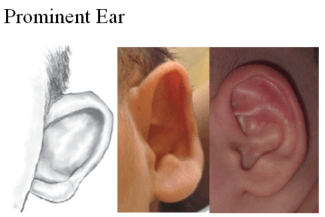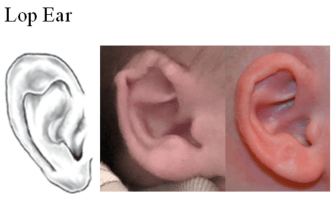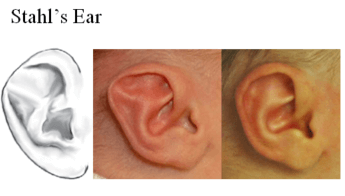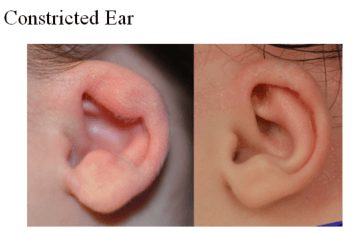Congenital Ear Deformations
Congenital ear deformations can range from small irregularities of the external ear to malformations such as complete microtia (severe underdevelopment) with associated hearing loss. These deformations can be a source of concern for the parents of newborns, and if allowed to persist beyond the neonatal period, the child may become self-conscious and desire surgical correction.
Many ear deformities can be treated non-surgically in the neonatal period while circulating maternal hormones allow for molding of the ear cartilage. Ear molding is a predictable non-surgical treatment for infants born with congenital ear deformations. UPMC Children's Hospital of Pittsburgh is dedicated to caring for the full range of congenital ear anomalies, with co-location of Pediatric Plastic Surgery, Otolaryngology and Audiology for team consultation as needed.
Early consultation with Lindsay Shuster, DMD, MS is encouraged. For many patients, an early protocol of ear molding therapy can correct the deformity and avoid later surgical correction. The period of treatment efficacy is limited, so referral at the first sign of an ear deformity is important.
Dr. Schuster gained fellowship training in molding for infants with auricular cartilage deformities and nasal cartilage deformities associated with cleft lip and palate at New York University's Institute for Reconstructive Plastic Surgery; she and her team at Children's Hospital of Pittsburgh has successfully correct hundreds of infant ear differences through molding. She is passionate about the impact it can have for patients; ear molding is one of her research interests and she has presented her work, teaching colleagues nationally and internationally.
Source: American Cleft and Craniofacial Association, Annual Meeting 2016. Invited Keynote Speaker, Mexican Association of Cleft Lip, Palate and Craniofacial Anomalies, Annual Meeting, 2016. Hospital Infantil de Mexico Federico Gomez, Mexico City 2018. Hong Gnoc Cochinchine Hospital, Hanoi, Vietnam 2018. El Salvador Association of Neonatologists and Pediatricians (ASONES, ASOPEDES), 2018 invited feature speaker.
With over 10 years of experience in infant ear molding, we look forward to welcoming your patient to UPMC Children's Infant Ear Molding practice. To schedule an appointment, please call 412-692-8799.
Congenital deformation of one or both auricles in the newborn is a relatively frequent phenomenon that can have a negative impact on psychological and social development. The incidence of auricular deformities has been reported to be up to 47 percent. Although some deformities may resolve spontaneously, it is not possible to predict which ones will resolve.(Matsuo, et. al.) Non-surgical correction of auricular deformities by splinting (ear molding) is a treatment option in the neonatal period. This conservative approach in the has the potential to eliminate the need for future reconstructive surgery.
The most common types of auricular deformities are lop ear, Stahl's ear and prominent ears, with variants of helical deformation, excess conchal cartilage, or lack of an antihelix.




Prominent ears may have an absent antihelical fold, obtuse scaphoconchal angle, increased distance from the helical rim to scalp and deep conchal bowl. The clinical features of lop ear may include flattening of the antihelix, widening of concha and overhang of helis. Stahl's ear is characterized by the presence of a third crus, flat antihelis and malformed scaphoid fossa. Other ear deformities include constricted ears, prominent conchal crus and mixed deformities, which are a combination of several ear differences. Malformations, including microtia and crypotia range in severity. Cryptotia, which is amenable to ear molding even beyond the neonatal period, is described as absence of the retroauricular sulcus, a sharply curved antihelical crus and no foreshortening of the auricle. Depending on severity, microtia malformations may benefit from ear molding in preparation for eventual reconstructive surgery. Children's Hospital of Pittsburgh is dedicated to comprehensive care for infant ear deformities, with team-based expertise in surgical reconstruction and audiologic rehabilitation.
The elasticity and ability to mold the auricular cartilage during the neonatal periods is associated with the increased concentration of maternal estrogen. Estrogen increases the level of hyaluronic acid, which disrupts the intercellular material in cartilage. Estrogen relaxes the cartilage, ligaments and connective tissue of the infant to pass through the birth canal. Ear molding takes advantage of this transient increase in estrogen. Experts agree that ear molding should be initiated as early as possible for the best treatment result; the fastest and best results are when treatment is initiated in the first weeks of life. Early treatment is critical; maternal estrogen decreases within the first six weeks - first months of life.
Ear molding relies on early splinting for correction of congenital auricular deformities. Splints or ear molds are custom made from dental and other materials. Specialized taping is placed, holding the mold in place and normalizing the ear anatomy. Depending on the technique used, the splint is removed for cleaning during bath time or stays in place until the next molding adjustment visit. The duration of treatment ranges from 3-12 weeks, with 2-4 adjustment visits. Treatment is complete when the splint can be removed for several days without relapse.
Each ear is unique—technique is individualized and Dr. Schuster often fabricates custom stents. Early referral to the Children's Hospital of Pittsburgh Infant Ear Molding practice is important for best treatment results. We look forward to welcoming your patient! Appointments can be made by calling 412-692-8799.
Infant Ear Molding at UPMC Children's
Director
Lindsay Schuster, DMD, MS
Assistant Professor
Pediatric Plastic Surgery
UPMC Children's Hospital of Pittsburgh
Administrative staff
Kristin Parady, AOAC
Availability
Dr. Schuster sees patients at UPMC Children's Hospital of Pittsburgh in the Lawrenceville section of Pittsburgh.
To reach our ear molding center, call 412-692-8799.












